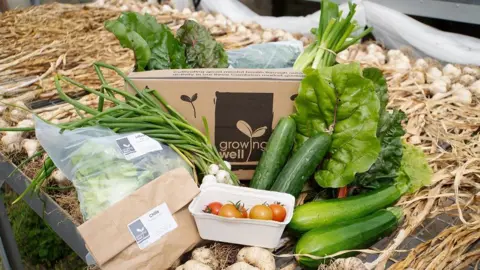The initiative designed to support low-income households with access to healthy produce is being led by Growing Well, a charitable organization. This program provides free vegetable boxes to families in need within the Mid Copeland area of Cumbria. With the rising cost of living, many families are struggling to afford fresh vegetables, marking this initiative as a timely intervention aimed at improving food security and health.
Growing Well’s initiative allows for the donation of up to 30 vegetable boxes every week, each filled with a selection of seven seasonal vegetables. The idea behind this donation is not just to provide food but to focus on the mental well-being of individuals, families, and couples who are facing financial difficulties. It is crucial to note that this service will be offered to various areas including Thornhill, Haile, Calderbridge, Ponsonby, Beckermet, Seascale, and Gosforth. The setup ensures that the entire process remains confidential, thereby giving recipients a sense of privacy and dignity.
The vegetable boxes are designed to be harvested weekly, ensuring fresh produce reaches the recipients either through a delivery service directly to their doors or at nearby collection points, making it more accessible for families who might lack transportation. This delivery system aims to reduce barriers for low-income families who often find it difficult to access fresh food options.
Hannah Wright, the manager at Growing Well West Cumbria, emphasized the importance of the initiative by stating, “We know there are families, couples, and individuals who are on a low income and are struggling and would benefit from support with regular fresh vegetables.” This sentiment captures the essence of the program, highlighting the organization’s commitment to aiding those most in need.
Furthermore, the application process to receive these vegetable boxes is intended to be straightforward and confidential. This aspect is vital as many families feel hesitant to seek assistance due to the stigma sometimes attached to receiving aid. Wright reassures potential recipients that the sign-up process is seamless, further encouraging those who might benefit from the service to apply.
This program is supported financially by the Mid Copeland GDF Community Partnership, a collaboration that underscores the value of community involvement in addressing local challenges. Initiatives like this reflect a growing awareness of the need to link mental health recovery with food security, emphasizing how nutrition plays a critical role in overall well-being.
The initiative stands as a beacon of hope during difficult times when households are challenged by economic hardships. By promoting the consumption of fresh, healthy foods, the vegetable box program not only enhances the dietary patterns of the participants but also fosters a sense of community and support.
Growing Well is also active on various social media platforms, encouraging local residents to follow their efforts on platforms such as Facebook, Instagram, and X. This outreach is intended to streamline communication and keep the community informed about available resources.
Additionally, the broader implications of such programs highlight the urgent need to address food deserts and access to fresh produce in rural areas. Low-income families often face increased barriers when it comes to sourcing healthy food options due to convenience and accessibility issues. By focusing on delivering fresh produce right to the doors of those in need, Growing Well is making substantial strides toward remedying these disparities.
In conclusion, the vegetable box initiative by Growing Well is a crucial step in providing necessary support to low-income households. It addresses both the need for healthy food access and the mental well-being of individuals during challenging economic times.












